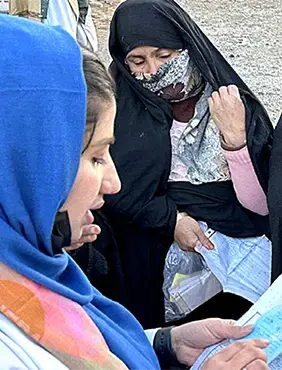On 7 October 2023, a magnitude 6.3 earthquake and several aftershocks hit western Afghanistan. The earthquake was felt across Badghis, Farah, Ghor and Herat City where it was particularly severe. The Afghanistan National Disaster Management Authority reported that the earthquake impacted 382 villages in 10 districts, ultimately affecting 1.6 million people, with 2,000 fatalities, 9,000 injured and 114,000 left in urgent need of humanitarian assistance in an already-fragile context where thousands of vulnerable women and adolescent girls already required assistance. The affected communities experienced significant damage, including the loss of lives, homes, livestock, agricultural lands, sources of livelihood and access to many essential facilities.
Previous experience indicated that the earthquake was likely to increase negative coping strategies among vulnerable female-headed households due to negative impacts on livelihoods and income- generating opportunities. Further exacerbating humanitarian needs in the earthquake-affected communities, in February and early March 2024, the western region was hard hit by severe snowfall.
Despite strong coordination by humanitarian actors to deliver a multi-sector response to affected communities, the needs of vulnerable women and adolescent girls remained largely underserved. As such, UNFPA’s earthquake response aimed to ensure the continuation of maternal, reproductive health, and psychosocial services for earthquake-affected women and adolescent girls in Zindajan, Robat Sangi, Injil, and Gulran districts. With the support of the UN Central Emergency Response Fund (CERF), UNFPA was able to help improve their access to lifesaving services for gender-based violence and psychosocial support via three key activities:
- Provision of psychosocial support services through psychosocial support teams.
- Procurement and distribution of in-kind Dignity Kits, Inter-Agency Reproductive Health Kits, and winterization kits for vulnerable women and adolescent girls.
- Provision of cash for the health and well-being needs of vulnerable earthquake-affected female-headed households.
- Cash assistance for women’s health and wellbeing in post-earthquake Herat
UNFPA’s provision of cash assistance took place from January to April 2024 in partnership with CARE International, reaching 405 affected female-headed households, including women with disabilities.
The cash assistance aimed to ensure that vulnerable women and their families had the means to meet their health and well-being needs through access to key services.


